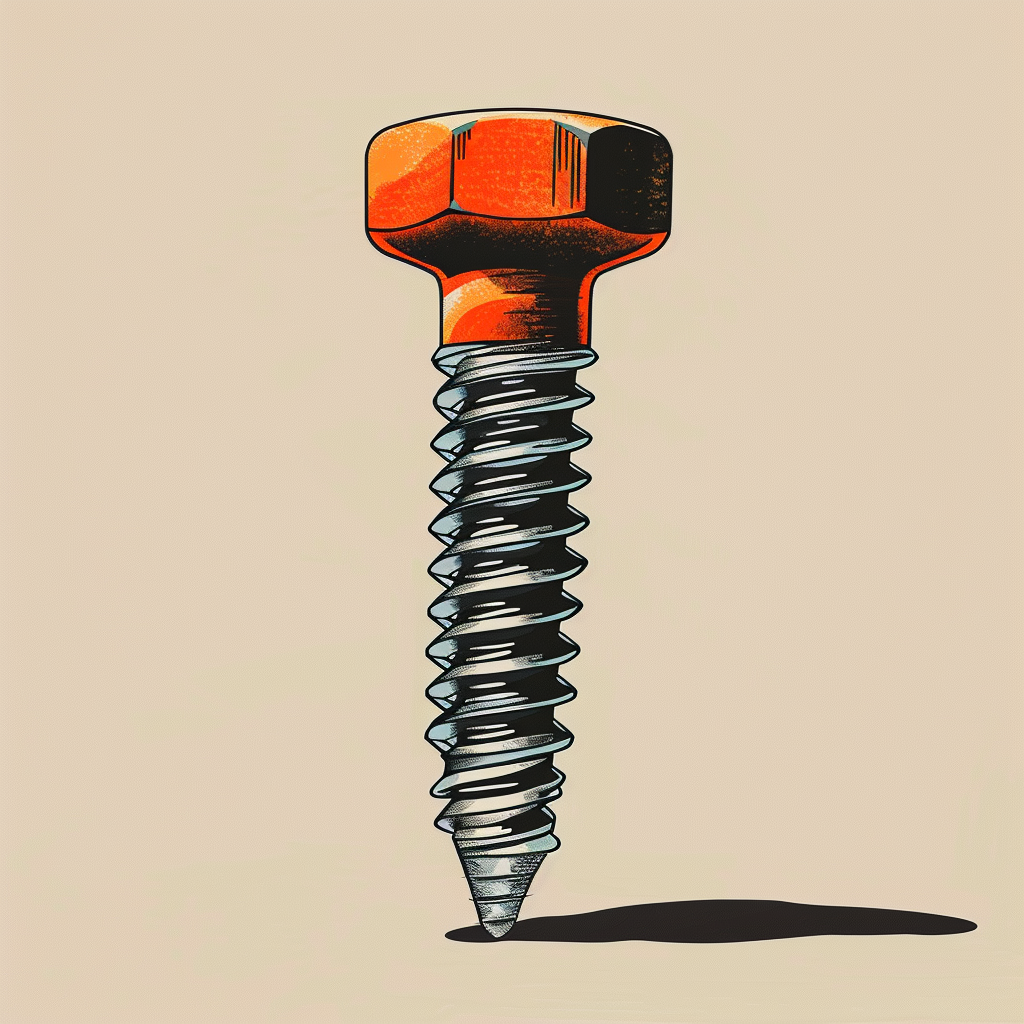Screw
Definition
Screw refers to a type of fastener, typically made of metal, characterized by a helical ridge known as a male thread or just thread. It can also be used as a verb meaning to fasten, assemble, or tighten objects with screws.
Parts of Speech
- Noun
- Verb
Pronunciation
American English
- IPA Pronunciation: /ˈskruːtɪni/
- Respelling: SKROO-tuh-nee (with "SKROO" as in "screw," "tuh" as a neutral sound, and "nee" as in "knee")
British English
- IPA Pronunciation: /ˈskruːtɪni/
- Respelling: SKROO-tuh-nee (similar to American English, with "SKROO" as in "screw," "tuh" as a neutral sound, and "nee" as in "knee")
The pronunciation of "scrutiny" is quite similar across both dialects, featuring a long "oo" sound in the first syllable and ending with a clear "nee." The "tuh" represents a softer, unstressed middle syllable, making the word's pronunciation accessible and straightforward.
Etymology
The word screw originates from the Old French word escroue, which refers to a "nut" or a "screw". This, in turn, derives from Latin scrofa or scrobis meaning a trench or ditch.
Derivatives
- Screwer
- Screwable
- Unscrew
- Screwdriver
- Screwy
Synonyms
- Fastener
- Bolt (in some contexts)
- Threaded pin
Antonyms
- None
Usage
The word screw is widely used in both construction and informal language. In the construction or mechanical context, it refers to a specific type of fastener used to join things together. Informally, it can also refer to cheating or exploiting someone, though this is a colloquial usage.
Related Terms
- Nail
- Bolt
- Fastener
- Screwdriver
- Thread
Detailed Definition
Noun
- Fastener: A small, sharp, or pointed metal pin with a raised helical thread running around it and a slotted head, used to join things together by being rotated so that it pierces wood or other materials and is held tightly in place.
- Example: He used a screw to fasten the two pieces of wood together.
- Colloquial Usage: In informal terms, a way to refer to an unfair or deceitful situation or action.
- Example: It's a screw if they promise things and don't deliver.
Verb
- Action of Fastening: To attach, fasten, or close something by putting screws into it.
- Example: He screwed the shelf to the wall securely.
- Colloquial Usage: To treat someone unfairly or dishonestly, often related to exploiting situations to one's advantage at the expense of others.
- Example: They feel like they got screwed in the deal.
screw



🇨🇳 Mandarin
- 螺丝 (luó sī)
- IPA Pronunciation: /luo˨˩˦ si˧˥/
- Respelling in English: luo-si
- 搞砸 (gǎo zá) (informal, to mess up)
- IPA Pronunciation: /kau˩˧˥ tsa˧˥/
- Respelling in English: gao-za
🇮🇳 Hindi
- पेच (pech)
- IPA Pronunciation: /pet͡ʃ/
- Respelling in English: pech
- धोखा देना (dhokhā denā) (informal, to deceive)
- IPA Pronunciation: /d̪hokʰaː d̪eːnaː/
- Respelling in English: dhokhaa denaa
🇪🇸 Spanish
- tornillo
- IPA Pronunciation: /torˈniʎo/
- Respelling in English: tor-nee-yo
- fastidiar (informal, to annoy)
- IPA Pronunciation: /fastiˈdjar/
- Respelling in English: fas-tee-dyar
🇫🇷 French
- vis
- IPA Pronunciation: /vis/
- Respelling in English: vees
- arnaquer (informal, to scam)
- IPA Pronunciation: /aʁnakɛʁ/
- Respelling in English: ar-na-ker
🇸🇦 Modern Standard Arabic
- برغي (burghī)
- IPA Pronunciation: /ˈbʊr.ɣiː/
- Respelling in English: bur-ghii
- خدع (khadaʿ) (to deceive)
- IPA Pronunciation: /xadaʕ/
- Respelling in English: khadaa
🇧🇩 Bengali
- স্ক্রু (skru)
- IPA Pronunciation: /skru/
- Respelling in English: skru
- প্রতারিত করা (pratārit kōra) (to deceive)
- IPA Pronunciation: /prɔtaːrit koraː/
- Respelling in English: pro-taarit koraa
🇷🇺 Russian
- винт (vint)
- IPA Pronunciation: /vʲint/
- Respelling in English: veent
- наебать (naebat') (informal, to deceive)
- IPA Pronunciation: /naɪˈbatʲ/
- Respelling in English: nai-bat
🇵🇹 Portuguese
- parafuso
- IPA Pronunciation: /pɐɾɐˈfuzu/
- Respelling in English: para-foo-zoo
- enganar (to deceive)
- IPA Pronunciation: /ẽˈɡa.naɾ/
- Respelling in English: enga-nar
🇮🇩 Indonesian
- sekrup
- IPA Pronunciation: /səˈkrup/
- Respelling in English: se-kroop
- menipu (to deceive)
- IPA Pronunciation: /məˈnipu/
- Respelling in English: me-nee-poo
🇩🇪 German
- Schraube
- IPA Pronunciation: /ˈʃʁaʊ̯bə/
- Respelling in English: shrau-be
- bescheißen (informal, to scam)
- IPA Pronunciation: /bəˈʃaɪ̯sən/
- Respelling in English: be-shai-sen
🇯🇵 Japanese
- ネジ (neji)
- IPA Pronunciation: /ne.d͡ʑi/
- Respelling in English: ne-ji
- だます (damasu) (to deceive)
- IPA Pronunciation: /da.masu/
- Respelling in English: da-masu
🇻🇳 Vietnamese
- ốc vít
- IPA Pronunciation: /ʔɔk̚˧˦ vit˧˦/
- Respelling in English: ok veet
- lừa dối (to deceive)
- IPA Pronunciation: /lwa˧˥ dɔj˧˥/
- Respelling in English: lwaa doy
🇰🇷 Korean
- 나사 (nasa)
- IPA Pronunciation: /na.sa/
- Respelling in English: na-sa
- 속이다 (sogida) (to deceive)
- IPA Pronunciation: /so.gi.da/
- Respelling in English: so-gee-da
🇹🇷 Turkish
- vida
- IPA Pronunciation: /viːˈdaː/
- Respelling in English: vee-daa
- aldatmak (to deceive)
- IPA Pronunciation: /alˈdatmak/
- Respelling in English: al-dat-mak
🇵🇰 Urdu
- پیچ (pīch)
- IPA Pronunciation: /piːt͡ʃ/
- Respelling in English: peech
- دھوکہ دینا (dhokha dena) (to deceive)
- IPA Pronunciation: /d̪hokʰaː d̪eːnaː/
- Respelling in English: dhokhaa denaa





